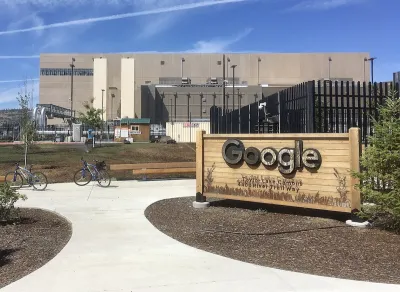The state legislature is poised to pass a law that would bring more data centers to the state, but critics say the move would threaten the state’s climate goals.

Critics of a proposed Michigan state bill aimed at attracting energy-guzzling data centers to the state say it amounts to the state backtracking on its climate and decarbonization goals.
As Tom Perkins explains in The Guardian, the massive energy draw required by data centers would likely trigger an “offramp” clause in climate legislation passed last year that would allow fossil fuel-powered plants to continue operating. “That would put an end to Michigan’s climate legislation that requires 100% renewable energy by 2040, and dramatically increase electric rates for residential customers, critics say.” In addition to electricity, data centers also consume massive amounts of water, up to 5 million gallons daily for evaporative cooling systems that critics say could be replaced with more efficient methods.
“Michigan isn’t alone, as data centers are quickly emerging as a serious threat to the nation’s climate goals. Tech companies use them to store servers and networking equipment that process the world’s digital traffic, and artificial intelligence is driving a boom,” Perkins adds. While some cities and states are wooing the companies for economic development, other places are considering bans in highly walkable commercial areas such as Atlanta’s Beltline.
FULL STORY: In threat to climate safety, Michigan to woo tech data centers with new laws

National Parks Layoffs Will Cause Communities to Lose Billions
Thousands of essential park workers were laid off this week, just before the busy spring break season.

Retro-silient?: America’s First “Eco-burb,” The Woodlands Turns 50
A master-planned community north of Houston offers lessons on green infrastructure and resilient design, but falls short of its founder’s lofty affordability and walkability goals.

Delivering for America Plan Will Downgrade Mail Service in at Least 49.5 Percent of Zip Codes
Republican and Democrat lawmakers criticize the plan for its disproportionate negative impact on rural communities.

Test News Post 1
This is a summary

Test News Headline 46
Test for the image on the front page.

Balancing Bombs and Butterflies: How the National Guard Protects a Rare Species
The National Guard at Fort Indiantown Gap uses GIS technology and land management strategies to balance military training with conservation efforts, ensuring the survival of the rare eastern regal fritillary butterfly.
Urban Design for Planners 1: Software Tools
This six-course series explores essential urban design concepts using open source software and equips planners with the tools they need to participate fully in the urban design process.
Planning for Universal Design
Learn the tools for implementing Universal Design in planning regulations.
EMC Planning Group, Inc.
Planetizen
Planetizen
Mpact (formerly Rail~Volution)
Great Falls Development Authority, Inc.
HUDs Office of Policy Development and Research
NYU Wagner Graduate School of Public Service





























